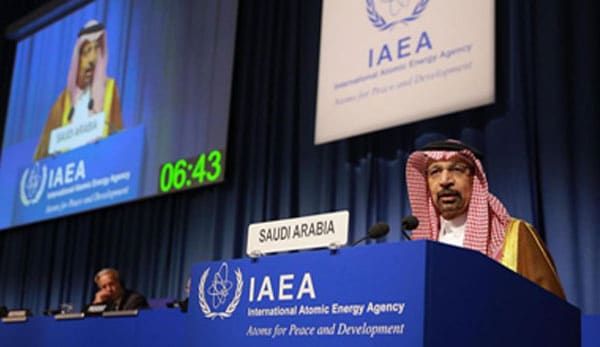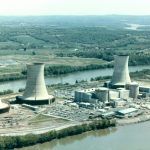If yes to Saudi Arabia, no to whom?
By Victor Gilinsky, Henry Sokolski | January 4, 2019
 Khalid A. Al-Falih, Saudi Arabia's Minister of Energy, Industry and Mineral Resources, met with US Energy Secretary Rick Perry last year to discuss a US-Saudi nuclear cooperation agreement.
Khalid A. Al-Falih, Saudi Arabia's Minister of Energy, Industry and Mineral Resources, met with US Energy Secretary Rick Perry last year to discuss a US-Saudi nuclear cooperation agreement.
Last month US Energy Secretary Rick Perry met with his Saudi counterpart, Khalid Al-Falih, to continue their dialogue on a US-Saudi nuclear agreement to permit sale of US reactor equipment to the kingdom. The official US announcement states Secretary Perry “underscored . . . any nation seeking to develop a truly safe, clean, and secure nuclear energy program should turn to American companies (our emphasis).” It is evident that despite the Khashoggi murder, and all it has revealed about Saudi Arabia and the worthlessness of its representations, the Trump administration still hasn’t given up on selling the kingdom technology that would inevitably give it a leg up on getting a bomb.
It is a vain hope to expect anything better from this administration. But it is surprising and disappointing that many prominent and oft-cited nonproliferation experts, both from the academy and from think tanks and foundations, don’t rule out a deal with the Saudis, either. Not only that, these “experts” waffle on what they consider acceptable nonproliferation terms for such a deal.
They bring out the usual arguments: If we insist on a tough standard the Saudis will turn to suppliers with lower standards, maybe even Russia and China; therefore we should go for a deal, so long as it is marginally tighter than that from an alternative supplier; and even if we can’t get what we want, we could obtain the “functional equivalent,” say, by getting Saudi promises to postpone any uranium enrichment for some years. But what are Saudi promises worth after their effective ruler, their foreign minister, and their ambassador in Washington brazenly lied about the Khashoggi murder? The Saudi lies should disqualify the kingdom as a recipient of nuclear technology.
What accounts for the complaisance of so many in the nonproliferation community, the intellectual guardians of nonproliferation policy, who understand the details in a way that the politicians do not, who are failing to support strict nonproliferation standards?
At bottom, the most significant factor is the power of the notion that, no matter what we do, nuclear energy use is inevitable and will spread around the world. Experts see their role as trying to inject into the political arrangements—in this case, on exports—conditions that will reduce proliferation dangers, consistent with that inevitable expansion. In their view, for the United States to be persuasive in proposing nonproliferation conditions it is essential for us to support nuclear energy use worldwide, despite the spread of commercial nuclear energy being the principal source of danger for nuclear proliferation. However honestly held, this view verges easily into a rationale for essentially unlimited nuclear exports. In any case, this outlook hamstrings any effort to develop serious policies to control proliferation. There may be valid reasons to support nuclear energy, but there are no valid nonproliferation reasons to support it.
Also operating in the nonproliferation community is the fear that criticism of nuclear energy will be construed as “anti-nuclear,” with consequent loss of credibility in establishment circles. The combined effect of support for the spread of nuclear power and the fear that opposing its spread will somehow seem “anti-nuclear” is a formula for ineffectiveness on a serious policy level. It makes for endless cost-benefit analyses and seminars, to little effect.
The practitioners, who assume the widespread use of commercial nuclear power is inevitable, see themselves as having a realistic view of the energy future, but, in fact, their assumptions are out of date. In the United States, the highly vaunted “nuclear renaissance” of dozens of new power reactors is now reduced to one ridiculously expensive construction project in Georgia kept alive with massive infusions of government funds. The truth is the US program of installing large light water reactors has run its course. It is difficult to believe there will ever be another such reactor purchased in the United State. They are too complicated, too difficult to evaluate in terms of safety, and too expensive. US operating light water reactors are a dying breed.
The prospects in the rest of the world are also dim, as the latest projections from the International Atomic Energy Agency show. (As it is congenitally overoptimistic about nuclear energy, only its “low” estimate merits attention.) Europe and Japan are not going to expand their nuclear commitments, and now it looks as if China, the mainstay of current construction, is also having second thoughts. A December 12 headline in The MIT Technology Review is “China’s losing its taste for nuclear power. That’s bad news.” From a nonproliferation point of view, it’s good news and should make it easier to apply tougher nonproliferation conditions on nuclear exports worldwide.
A number of the countries seeking nuclear energy are doing so not in spite of its connection to weapons but because of it. Saudi Arabia surely falls in this category, as the crown prince made clear when he said he would get nuclear weapons if Iran did. Iran is of course already suspected of weapons ambitions. He would obviously want to be in a position to move quickly. Is this the scorpions-in-a-bottle scenario we want to encourage?
There is yet another concern. As nuclear energy programs decline in many countries, will their nuclear experts be tempted to turn to making bombs? To return to the Saudi case and Secretary Perry’s comments about selling to any country that truly wants safe nuclear power: After recent events, does anyone believe that the Saudis are capable of maintaining a truly independent nuclear regulatory authority, the sine qua non of nuclear safety? More important, isn’t the main concern not the Saudi’s interest in nuclear safety, but the trustworthiness of their promises in regard to bomb making?
On December 17, a Saudi statement attacked the US Senate for its unanimous conclusion that the crown prince was responsible for the Khashoggi murder: “The Kingdom categorically rejects … any and all accusations, in any manner, that disrespect its leadership.” Is this how the Saudis would meet US charges of irregularities in their nuclear program if such charges are in order? Is this a basis on which we can be confident our technology will not be misused? Not likely in Saudi Arabia, not likely for any country.
Together, we make the world safer.
The Bulletin elevates expert voices above the noise. But as an independent nonprofit organization, our operations depend on the support of readers like you. Help us continue to deliver quality journalism that holds leaders accountable. Your support of our work at any level is important. In return, we promise our coverage will be understandable, influential, vigilant, solution-oriented, and fair-minded. Together we can make a difference.
Keywords: Khashoggi
Topics: Analysis, Nuclear Energy, Nuclear Risk, Nuclear Weapons

















Strange. The Saudi’s like, oh, Bangladesh, the UAE next door, Turkey, and dozens of other countries are all embarking on nuclear energy without “US technology”. There is a HUGE scramble among the largest exporters, namely NOT the U.S. but China, Russia (the largest exporter in the world) and S. Korea to bid on tenders internationally. Almost no weapons programs have ever been developed from commercial nuclear reactors…so why is the Bulletin so upset? Even the U.S. and Israel were not opposed to Iran (and still not as far as I can tell) developing their commercial nuclear power program (with a… Read more »
Not so sure your right, DW. Israel/South Africa, India, Pakistan and North Korea developed their weapons programs under the veil of nuclear energy programs or with research reactors. Nuclear weapons programs need nuclear fuel cycles and a way to enrich U or make PU. Weapons capable U and Pu are not on the market. Most countries with nuclear energy programs are directly or indirectly run by government. Few can ever be classified as “commercial”; the technology and the infrastructure are too sensitive and more importantly due to security and strategic concerns. At most the fission energy establishment is effectively a… Read more »